Materials and News "Green Campus Strategies: EU Experience for Ukrainian Universities" (2024)

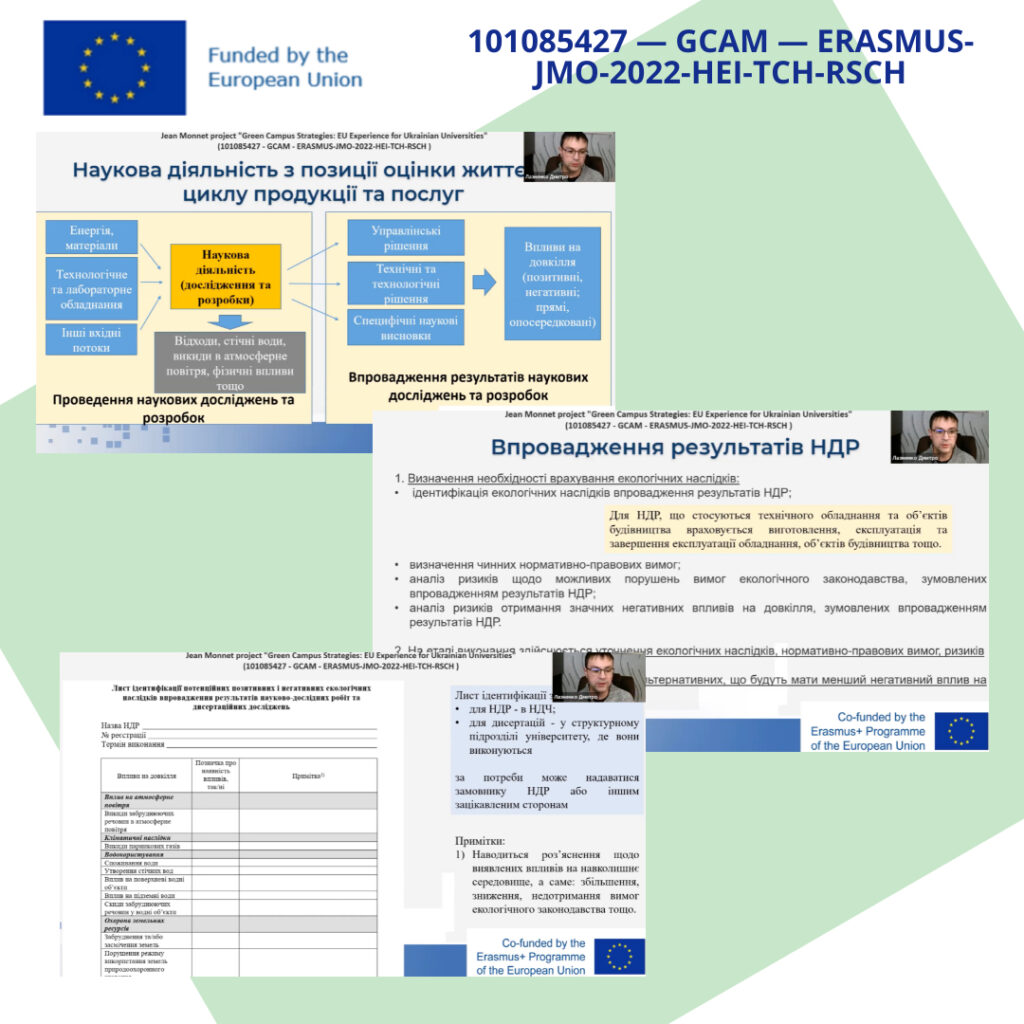
ROUND TABLE FOR SCIENTISTS
On October 9, 2024, within the framework of the Jean Monnet project “Green Campus Strategies: EU Experience for Ukrainian Universities” (101085427 — GCAM — ERASMUS-JMO-2022-HEI-TCH-RSCH), a round table was held on the topic: “Academic Cooperation: Advocacy for Implementing the Best EU Practices for Green Campuses.”
Participants of the event, researchers, lecturers, and representatives of the Sumy State University academic community, discussed key issues related to life cycle assessment of products and services in scientific activities, as well as the implementation of research results considering environmental impacts.
Particular attention was paid to the following topics:
- the need to consider environmental impacts during the implementation of research projects;
- identification of regulatory requirements and risks regarding the environmental consequences of R&D;
- identification of potential positive and negative environmental impacts at all stages of the research and development life cycle;
- prevention of violations of environmental legislation and the search for alternative solutions with lower environmental impact.
As a result of the discussion, emphasis was placed on the importance of integrating European practices in the field of sustainable university development and actively applying environmental impact assessment tools in scientific research.
The event became another step in shaping a green academic culture and disseminating European experience among Ukrainian universities.
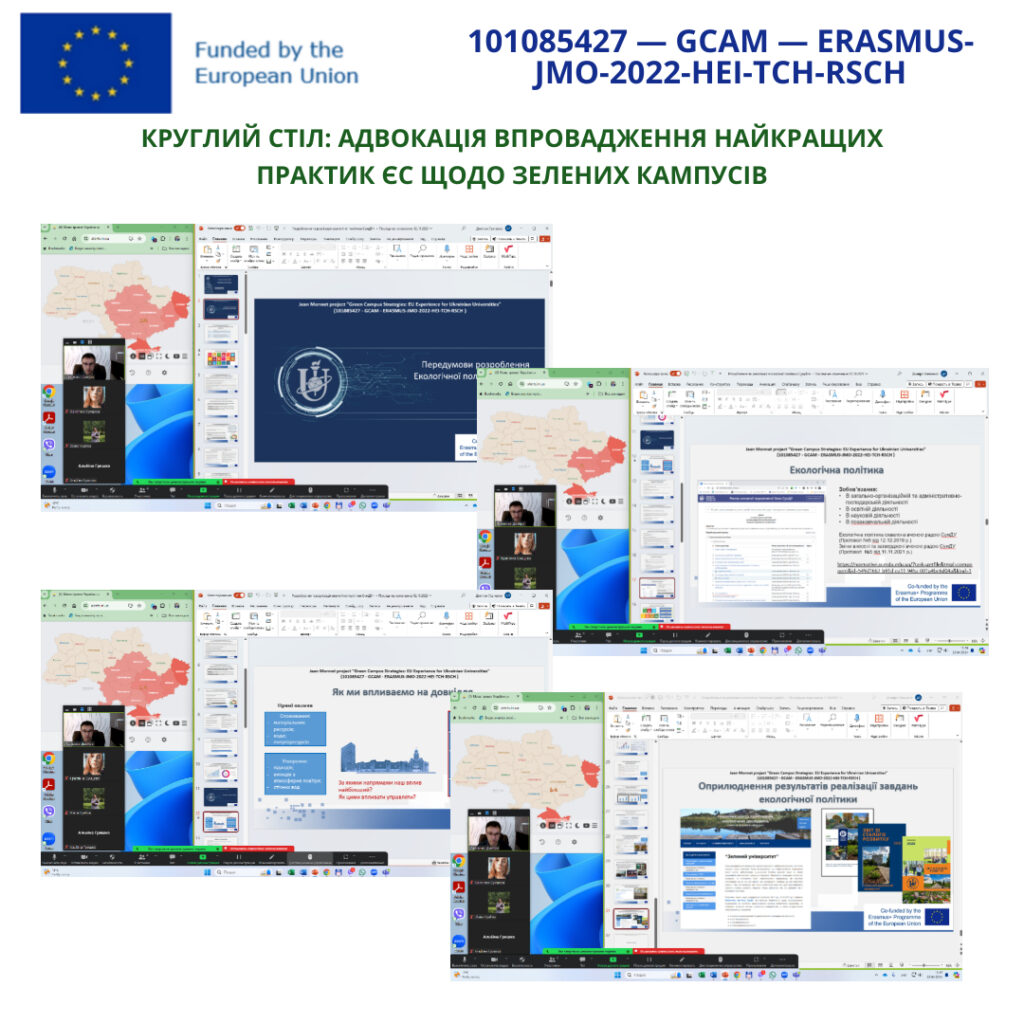
ROUND TABLE: ADVOCATING THE IMPLEMENTATION OF THE BEST EU PRACTICES FOR GREEN CAMPUSES
On June 14, 2024, within the framework of the international educational project “Green Campus Strategies: EU Experience for Ukrainian Universities” (101085427 — GCAM — ERASMUS-JMO-2022-HEI-TCH-RSCH), Dmytro LAZNENKO and Kostiantyn KYRYCHENKO held a round table on the topic: “Academic Cooperation: Advocacy for the Implementation of the Best EU Practices in Green Campuses”. The event was attended by representatives of the university administration and technical staff.
The primary goal of the round table was to discuss practical mechanisms for integrating sustainable development principles into the university’s infrastructure. The administration and technical services identified their key roles in implementing environmental policy, as they ensure the stable operation of the campus and drive practical changes.
Key Discussion Areas
Participants focused on the following directions:
- introduction of energy-efficient technologies in university buildings;
- establishment of a waste management system, including sorting and recycling;
- modernization of lighting and heating to reduce energy consumption;
- development of sustainable transport infrastructure (bike parking, charging stations for electric vehicles);
- creation of an environmental monitoring and regular reporting system.
Outcomes
As a result of the round table, preliminary steps for the university’s environmental policy roadmap were developed, namely:
- conducting an energy audit of university buildings;
- gradual implementation of separate waste collection systems in all facilities;
- drafting a modernization plan for the university’s technical systems in line with EU standards;
- establishing a coordination mechanism between the administration and technical units for sustainable resource management.
Significance for the University
This dialogue became an important stage in shaping the university’s joint sustainable development strategy, where technical staff and leadership act as key partners in implementing ecological innovations. The event demonstrated that the integration of the best EU practices is possible only with active cooperation among all university structures.
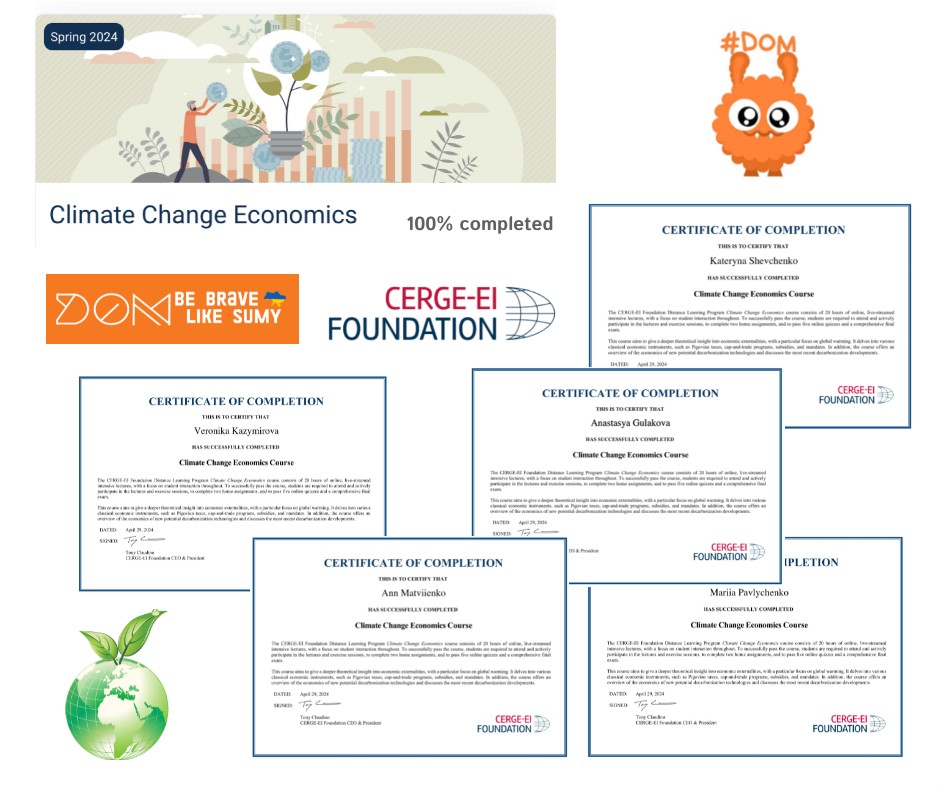
CLIMATE CHANGE ECONOMICS: COURSE COMPLETED
Our tireless students gained incredibly valuable experience from the CERGE-EI Foundation (Czech Republic). For two months (April and May 2024), students studied the discipline “Climate Change Economics” in English.
The course lecturer was Professor Silvester Van Koten (Netherlands).
The main topics covered were:
- Global climate change;
- Development of renewable energy;
- The European Union’s experience in preventing climate change;
- Economic instruments for decarbonization;
- Ways to overcome global negative externalities.
The course included a series of intensive lectures, online quizzes, practical seminars, and individual assignments.
The marketing students engaged with modern learning practices, acquired new knowledge, and gained experience communicating with international instructors.
The course was facilitated by Professor Olena Chyhryn from SumDU’s Marketing Department.
More to come…
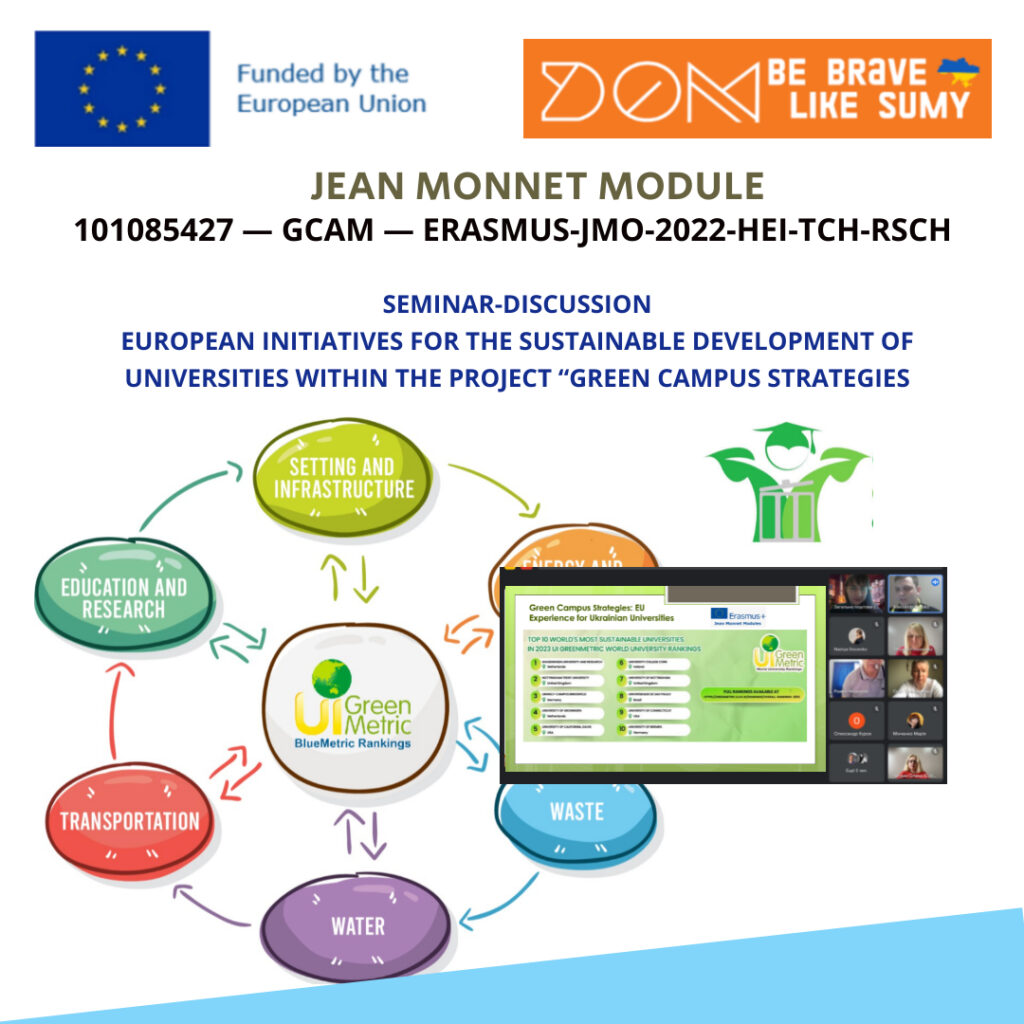
SEMINAR-DISCUSSION: EUROPEAN INITIATIVES FOR THE SUSTAINABLE DEVELOPMENT OF UNIVERSITIES WITHIN THE PROJECT “GREEN CAMPUS STRATEGIES”
On May 8, 2024, within the framework of the project “Green Campus Strategies: EU Experience for Ukrainian Universities” (101085427 — GCAM — ERASMUS-JMO-2022-HEI-TCH-RSCH), Olena Chygry provided an open seminar-discussion, dedicated to the overview of European initiatives and networks that stimulate the implementation of “green” practices in university campuses.
Participants were introduced to European networks and platforms that actively shape the agenda in the field of university sustainable development:
- UI GreenMetric World University Ranking – an international ranking of universities based on sustainability indicators;
- EAUC (Alliance for Sustainability Leadership in Education) – a network that unites educational institutions and leaders in ecological transformation;
- ICLEI – Local Governments for Sustainability – a global association that helps educational and municipal institutions implement “green” strategies;
- Green Office Movement – a student-oriented initiative ensuring the practical integration of sustainability principles into university life;
- Race to Zero for Universities & Colleges – an international campaign aimed at achieving carbon neutrality in higher education institutions.
Special attention was paid to interactive formats:
- Eco-hackathon: participants were able to quickly generate ideas for “green” campaigns on campus. Among the proposals were the creation of university programs such as “Zero Waste Week”, the introduction of an energy consumption monitoring system, and the organization of green mobile hubs for students.
- Eco-challenge for students: an initiative was announced to give up plastic for one week and share results on social media. This challenge aimed to demonstrate how even small daily changes can have a significant environmental impact.
The seminar demonstrated that integrating European experience into Ukrainian universities can become an effective tool for shaping ecological culture. Participants emphasized that the proposed activities contribute not only to discussing ideas but also to implementing practical steps toward the sustainable development of the university environment.
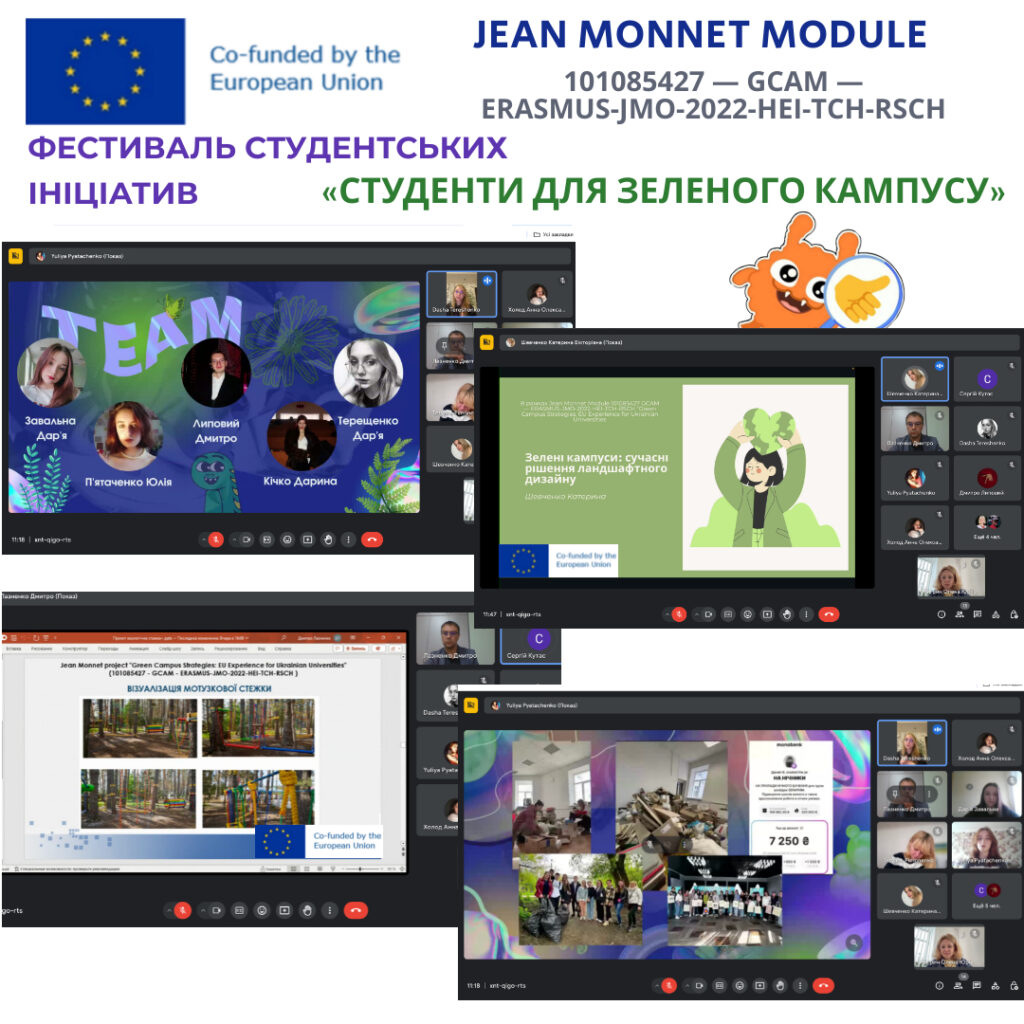
STUDENTS FOR A GREEN CAMPUS
Festival of Student Initiatives within the Project “Green Campus Strategies: EU Experience for Ukrainian Universities”
On April 26, 2024, under the motto “Think Globally – Act Locally!”, Sumy State University hosted the Festival of Student Initiatives, organized within the framework of the international project “Green Campus Strategies: EU Experience for Ukrainian Universities.”
The festival was aimed at promoting environmental awareness among young people and encouraging student-led initiatives that contribute to the creation of a green campus, inspired by the best practices of European universities.
Development and Presentation of Innovative Student Projects
Students presented their own ideas and solutions for the development of the university’s green infrastructure:
- waste sorting systems,
- energy-saving technologies,
- campus greening initiatives,
- educational and awareness-raising campaigns.
The presentations highlighted the creativity and motivation of young people to implement European approaches to sustainable development at the local level.
Student Team Projects and Presentations
Students of management, economics, and engineering joined the project team.
Participants presented their projects on the following topics:
- Implementation of green technologies and recycling at the university
Anna Kholod: “Implementation of Green Campus Practices in Ukraine and the EU: Alternative Energy Technologies and Recycling.”
- Landscape design
Kateryna Shevchenko: “Green Campuses: Modern Landscape Design Solutions.”
- Organization of student spaces
Daria Tereshchenko, Daria Zavalna, Yulia Pyatachenko, Dmytro Lypovyi, Daryna Kychko: “Creating Modern Academic Spaces for Promoting Green Campus Ideas.”
- Development of green infrastructure
Pavlo Tkach, Serhii Kutas: “Eco Trail.”
- Case studies of European universities
Alla Treus, Alina Simanovska: “Green Policy of the Czech University of Life Sciences.”
Liliia Derkach: “Experience of Implementing Green Campuses at the University of Liverpool.”
Illia Lubenets: “Poland’s Experience in Implementing University Green Campuses.”
Anna Mukoriz, Tetiana Sakhnenko: “Green Policy of the Technical University in Košice.”
Kateryna Petrenko: “Green Campus Practices at Universities in Spain and Sweden.”
Daryna Piven: “Green Technologies at the Gottfried Wilhelm Leibniz University of Hannover.”
The presented projects generated great interest among the audience. Festival participants also shared their own experiences of implementing environmental initiatives as part of building a green campus, such as Ecoweek and Eco-Subbotnik (Ecological Clean-up Day).
ECOLOGICAL ACTIVITIES
- Paper Recycling Campaign.
The student community actively took part in collecting waste paper for recycling. This initiative not only helped reduce waste but also became an example of how a small local action can have a global environmental effect. - Workshops “Giving Things a Second Life.”
Students and organizers demonstrated practical ways of reusing everyday items, promoting conscious consumption and the reduction of unnecessary waste.
One of the participants emphasized:
“This festival has shown that each of us has the power to make a change for the better. From idea to practical action is just one step.”
FUTURE PLANS
The organizers plan to expand the festival program by adding new forms of activities, including eco-quests, cycling marathons, and energy-saving competitions to engage even more students in the movement for a “green university.”
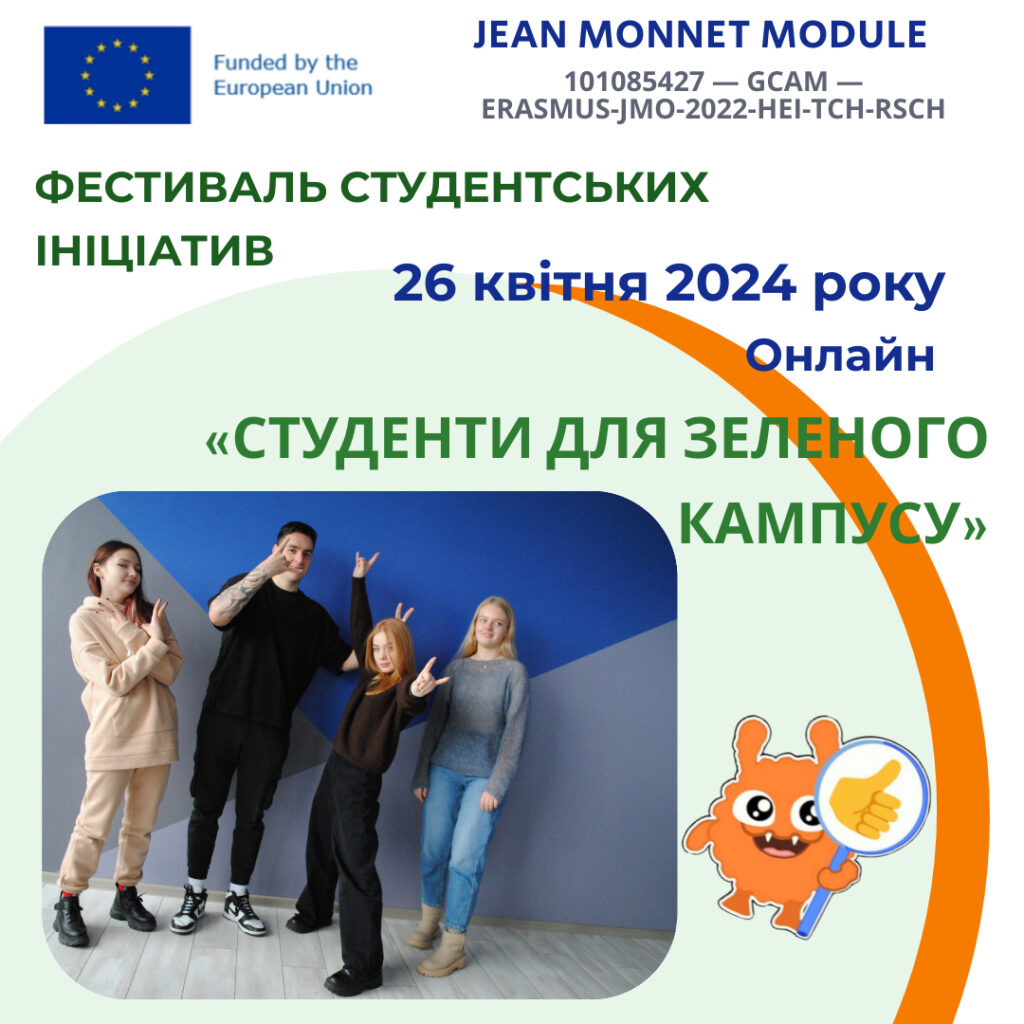
FESTIVAL OF STUDENT INITIATIVES "STUDENTS FOR A GREEN CAMPUS"
Come join our Festival of Student Initiatives “Students for a Green Campus”!
If you have ideas on how to make the university campus environmentally friendly, we’re waiting for you!
When? April 26, 2024
Where? Google Meet online platform
Participation is free. Active participants will receive a certificate. The registration deadline is April 24, 2024.
The project is co-funded by the European Union’s Erasmus+ program as part of the module “Green Campus Strategies: EU Experience for Ukrainian Universities.”
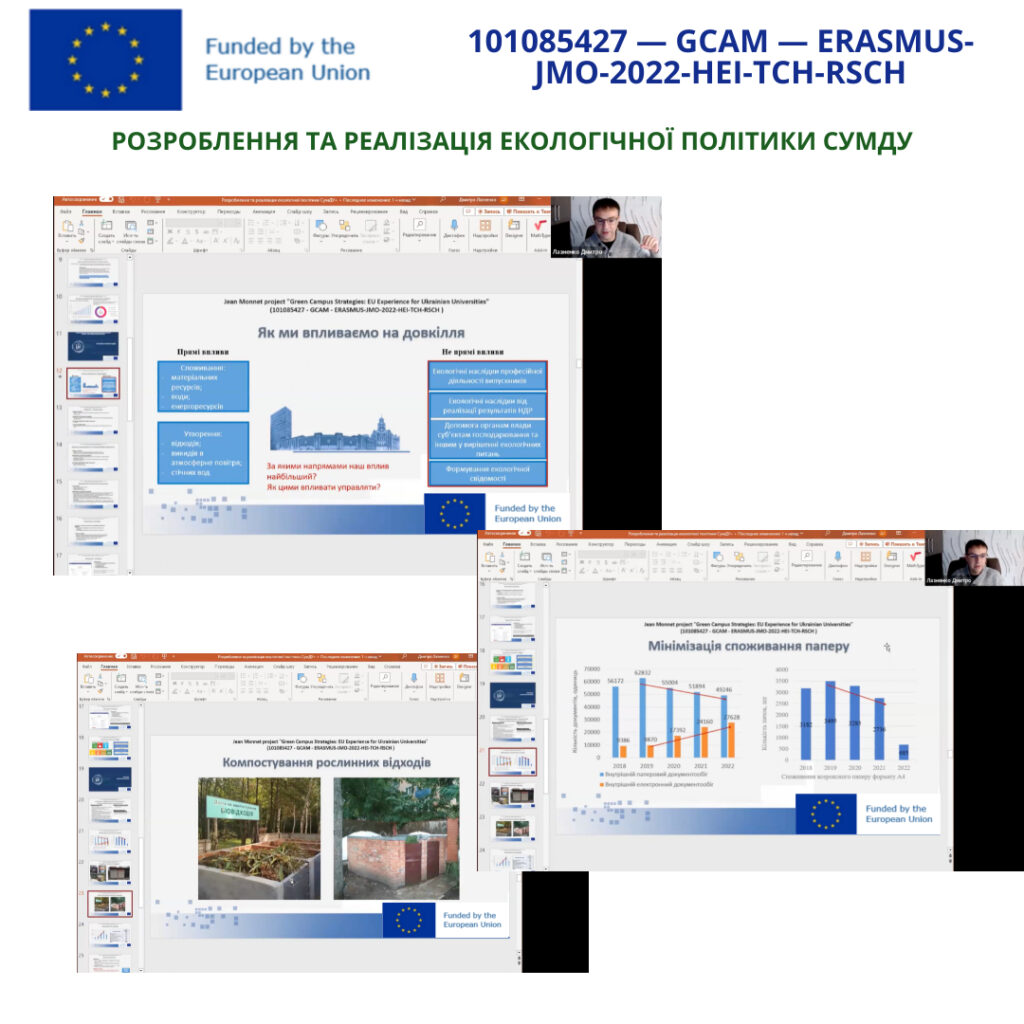
DEVELOPMENT AND IMPLEMENTATION OF SUMDU’S ENVIRONMENTAL POLICY
On April 25, 2024, within the framework of the Jean Monnet project “Green Campus Strategies: EU Experience for Ukrainian Universities”, Associate Professor of the Department of Ecology and Environmental Protection Technologies, Dmytro LAZNENKO, conducted a seminar on the topic: “Development and Implementation of SumDU’s Environmental Policy.”
The seminar was attended by undergraduate students of the Department of Ecology and Environmental Protection Technologies.
The following issues were discussed:
- Prerequisites for the development of SumDU’s Environmental Policy – global and national trends in sustainable development, requirements of European standards, and the role of universities as drivers of ecological change.
- SumDU’s Environmental Policy – the university’s strategic principles in the fields of environmental protection, energy efficiency improvement, waste management, sustainable infrastructure development, and ecological awareness.
- Implementation of the Environmental Policy – concrete steps already being taken on campus: waste sorting, introduction of energy-saving technologies, and the promotion of “green” lifestyle practices among students and staff.
Significance for the University
The seminar became a platform for active discussion of ways to integrate ecological approaches into the daily activities of the university. Participants emphasized that it is important not only to develop formal documents but also to create effective mechanisms for their implementation.
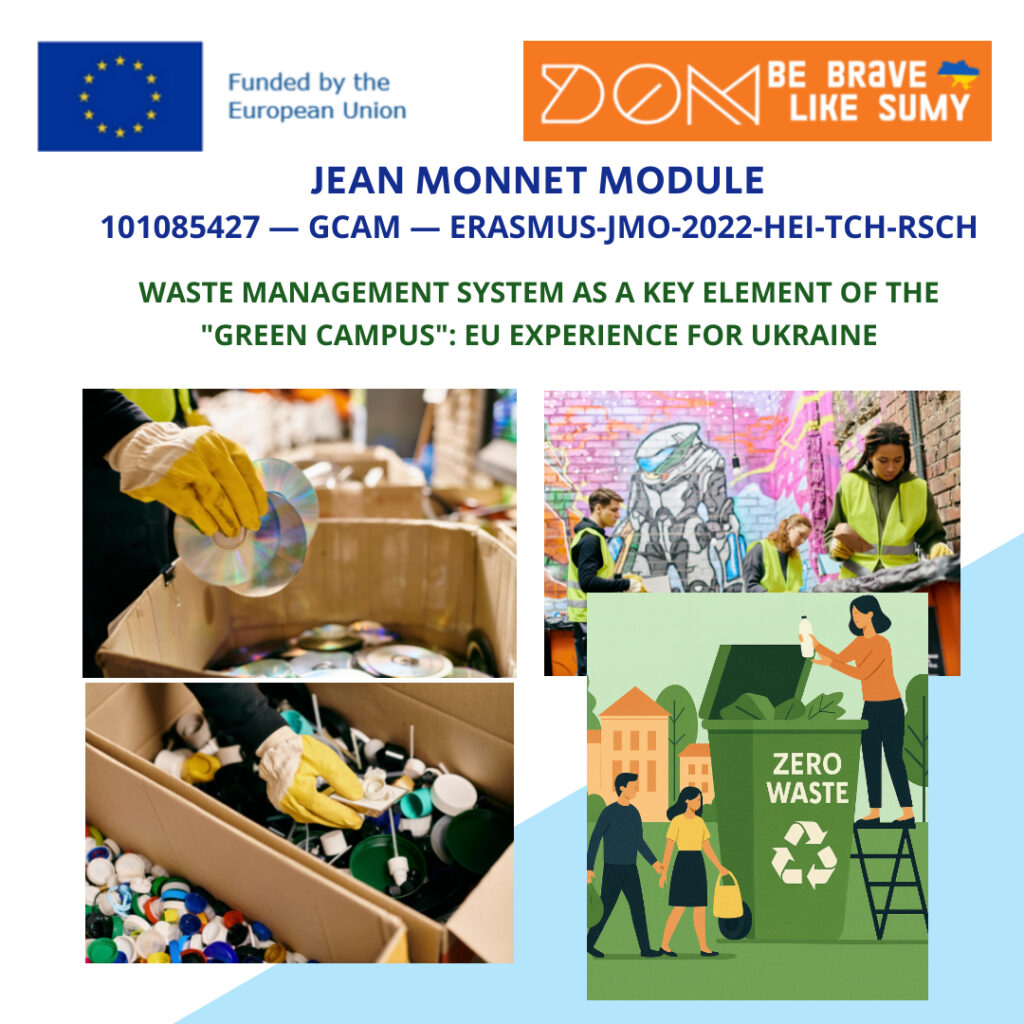
WASTE MANAGEMENT SYSTEM AS A KEY ELEMENT OF THE "GREEN CAMPUS": EU EXPERIENCE FOR UKRAINE
As part of the international educational project “Green Campus Strategies: EU Experience for Ukrainian Universities” (101085427 — GCAM — ERASMUS-JMO-2022-HEI-TCH-RSCH), on March 19, a lecture by Dmytro LAZNENKO was held, dedicated to waste management systems as an important component of the “green campus” concept.
Participants were introduced to the key directions of ecological transformation in universities:
- separate collection and recycling of waste,
- reduction of plastic and single-use materials,
- implementation of “zero waste” principles,
- creation of digital monitoring and control systems for waste streams,
- involvement of the university community in eco-initiatives through practical tasks, volunteering, and educational programs.
Students noted that the lecture not only provided theoretical knowledge but also inspired practical steps within the university environment.
- Some emphasized that, after reviewing the examples of European universities, they are ready to initiate new environmental projects on their campuses.
- Others highlighted that the lecture helped them understand how everyday practices, such as waste sorting or the use of reusable items, can have a long-term positive effect.
- A particular interest was aroused by the idea of using the campus as a “living laboratory of change,” where new ecological approaches can be tested.
The discussion showed that Ukrainian universities have significant potential in implementing effective waste management systems. The use of European experience will allow adapting proven solutions to local conditions and making universities an example for the community in the field of sustainable development.
The project is implemented with the support of the European Union and aims to spread European practices among Ukrainian higher education institutions, helping to form a new ecological culture among students and teachers.
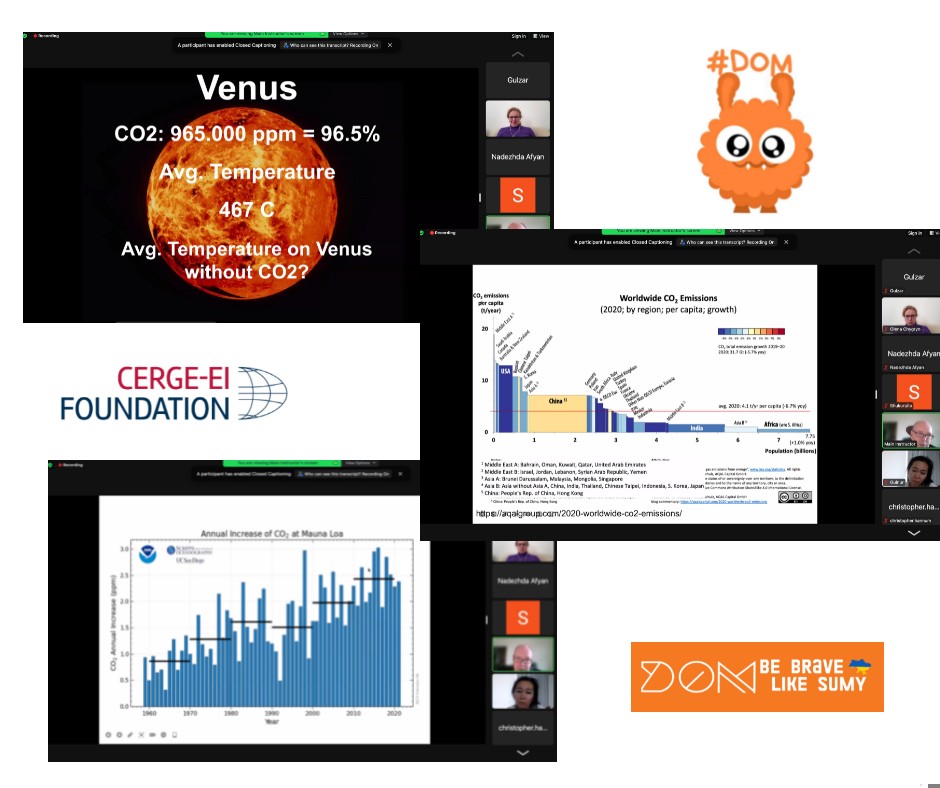
CLIMATE CHANGE ECONOMICS: EXPERIENCES FROM LEADING SCIENTISTS
Our tireless students have joined a new international project from the CERGE-EI Foundation (Prague, Czech Republic), within which students have begun studying the discipline “Climate Change Economics” in English. Professor Olena CHYHRYN from SumDU’s Marketing Department is accompanying the course.
On March 5, lectures began with Dr. Silvester van Koten, dedicated to the study of climate change, global trends in environmental pollution, and tools for decarbonizing the economy.
For our tireless students, this is a new educational experience engaging with a discipline taught by leading foreign instructors.
To be continued…
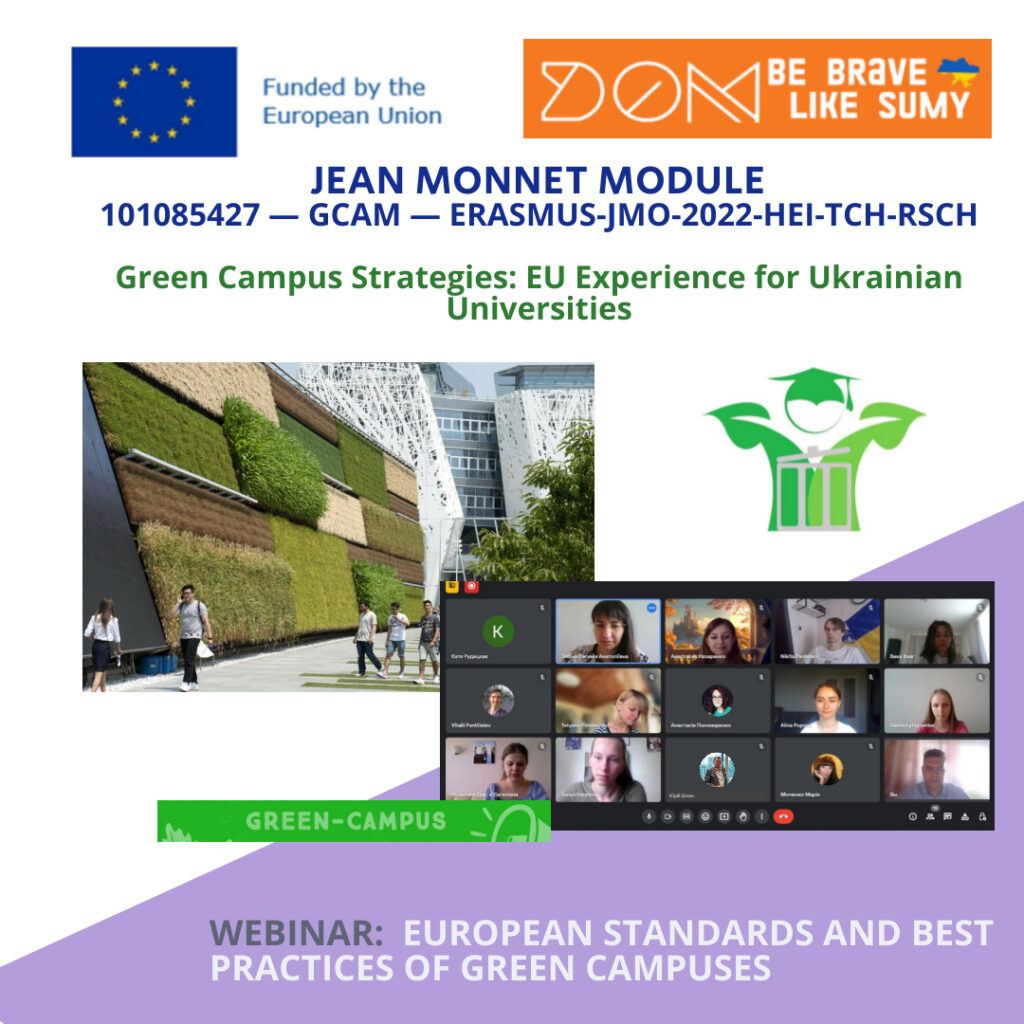
EUROPEAN STANDARDS AND BEST PRACTICES FOR GREEN CAMPUSES
European standards and best practices for green campuses aim for environmental sustainability and the creation of favorable conditions for learning and work. These topics, among many others, were discussed at a lecture by Yurii BILAN, Professor at SumDU’s Marketing Department and Rzeszów University of Technology, Poland. The lecture took place on March 5, 2024, for students and postgraduate students of the Marketing Department.
The lecture covered the following key issues:
- Energy efficiency and the use of renewable energy sources.
- Utilizing eco-friendly materials.
- Adherence to green building standards (Building Research Establishment Environmental Assessment Method, Leadership in Energy and Environmental Design).
- Environmental education and student engagement.
These standards and practices not only help reduce the environmental impact of universities but also foster conscious environmental behavior among students and staff.
The event provided students with an opportunity to learn about the latest achievements and practices in sustainable development and their application in universities. The lecture was followed by a discussion and a Q&A session with Yurii Bilan.
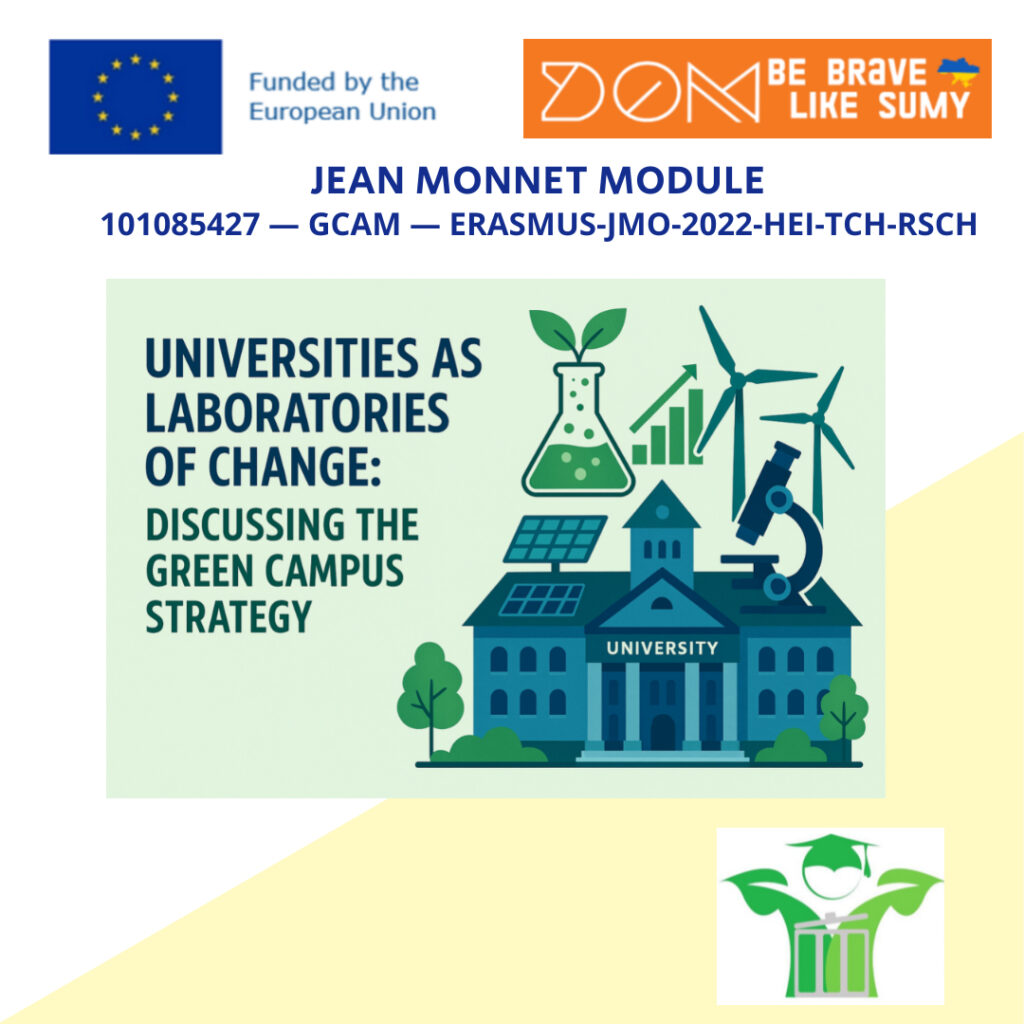
UNIVERSITIES AS LABORATORIES OF CHANGE: DISCUSSING THE GREEN CAMPUS STRATEGY
As part of the international educational project “Green Campus Strategies: EU Experience for Ukrainian Universities” (101085427 — GCAM — ERASMUS-JMO-2022-HEI-TCH-RSCH), on February 9, 2024, a lecture by Olena CHYGRYN took place, dedicated to the implementation of the “green campus” concept in higher education institutions of Ukraine.Olena presented key European practices of ecological transformation in universities, including:
- the introduction of energy-efficient technologies,
- the use of renewable energy sources,
- the organization of waste separation systems and the development of environmentally friendly transport.
Special attention was given to the role of universities as “living laboratories of change”, where students and teachers can actively participate in the practical implementation of sustainable development principles.
“European experience shows that universities can become a driving force of societal transformation, as they combine educational, research, and management activities. For Ukraine, this is a chance to create new models of sustainable development that address today’s environmental challenges,” was emphasized during the lecture.
The event sparked active discussion among participants, who highlighted the relevance of the presented examples and the potential for their adaptation to Ukrainian realities.
The project is supported by the European Union and aims at integrating European experience in the field of sustainable university development. This will contribute to shaping modern green campus strategies for Ukrainian higher education institutions.
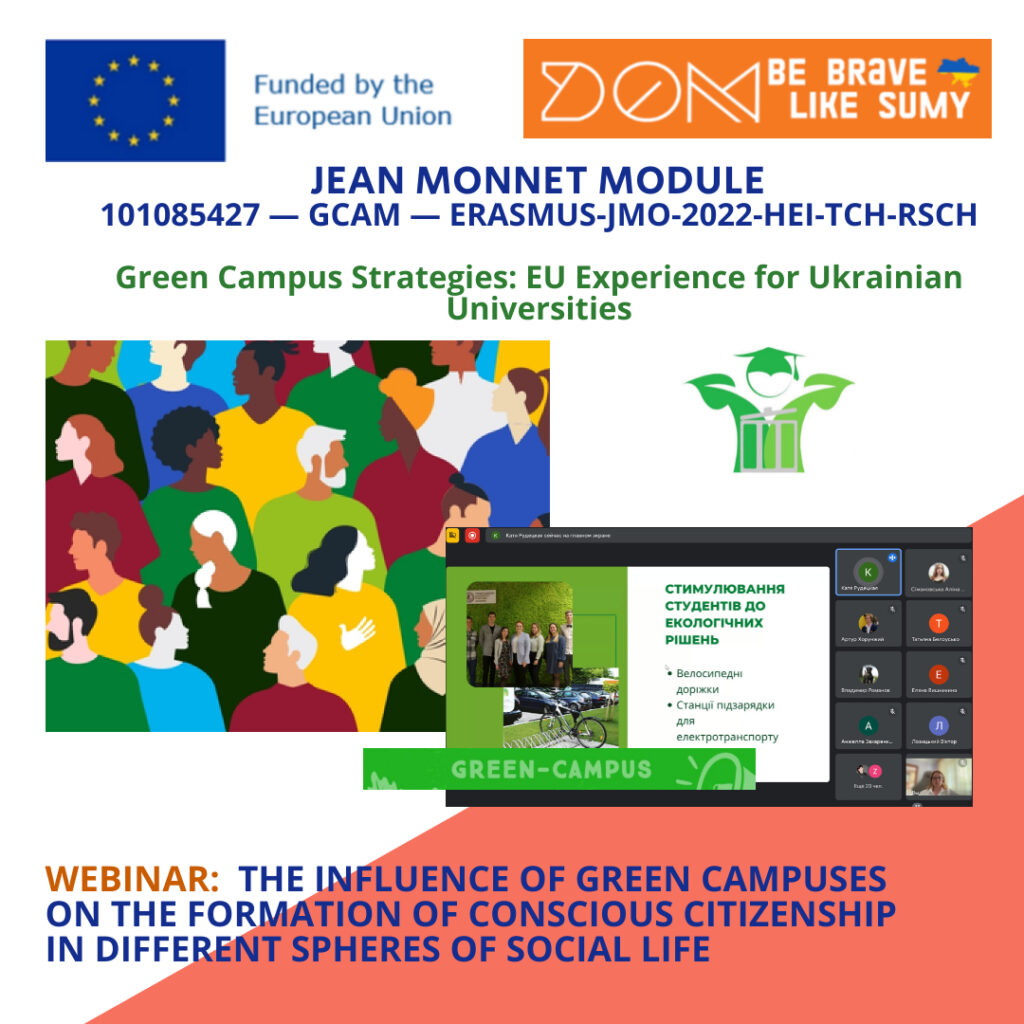
THE IMPACT OF GREEN CAMPUSES ON FORMING CONSCIOUS CITIZENSHIP IN VARIOUS SPHERES OF PUBLIC LIFE
On February 6, 2024, Master’s students specializing in “Marketing” joined a webinar led by Olena CHYHRYN. The webinar focused on examining the impact of green campuses on fostering conscious citizenship in various spheres of public life.
The main topics discussed during the meeting included:
- formation of ecological awareness: specifically, how green campuses contribute to increasing student awareness about the importance of environmental preservation. Students showed interest in potential programs for carbon footprint reduction, waste recycling, and energy conservation. Such measures help cultivate environmentally conscious behavior, which influences their future decisions in various aspects of life, from consumption habits to participation in public initiatives;
- development of civic engagement: the discussion also covered fostering civic activism among youth. Involvement in environmental projects at the university level encourages students to actively participate in local initiatives and implement sustainable practices within their communities. This helps develop leadership qualities and increases responsibility for the environment;
- integration of sustainable solutions into professional life: Attendees discussed how graduates from green campuses, who already have experience in implementing environmental initiatives, are more likely to integrate sustainable development principles into their professional careers;
- social justice: students agreed that through green campus programs, they gain knowledge about the importance of ecological and social justice. This fosters an active civic stance towards social issues such as climate change, inequality in access to resources, and support for vulnerable populations.
The meeting participants agreed to hold future events aimed at realizing student initiatives.







